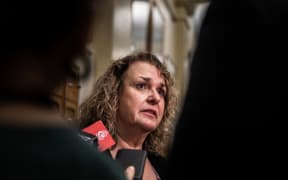
Schools in Auckland will get funding based on past allocations for high need students. Photo: 123RF
Some principals are worried by changes to the way the Education Ministry allocates millions of dollars for children with high needs.
From next term, Auckland schools will no longer apply for In Class Support for their pupils, a source of funding worth about $18 million a year nationally.
Instead each school would receive funding based on their allocations over the past five years.
The Education Ministry said the change would reduce unnecessary applications for resources where the need was already known.
It said the move was an interim measure which would be reviewed later in the year but it was considering making the change in other regions.
In Class Support was for children with high learning needs who did not qualify for long-term support through the Ongoing Resourcing Scheme (ORS).
A group of 16 principals in the Eden-Albert area told RNZ it wrote to Education Minister Jan Tinetti last month to share its reservations about the change.
One of the principals, Malcolm Milner from Balmoral School, said just 27 percent of the group's applications for In Class Support were successful.
"There's this huge need in our schools that we're prepared to work really hard to put the funding in, but then we're not getting it."
Milner said the change to the allocation process would reduce workloads, but teachers made the applications because they believed their students really needed the support.
He said the new allocation system would mean the ministry no longer had any figures showing how many children needed support, but were not getting it.
"Then there is no data collected by the Ministry of Education for this unmet need so there's no longer the waiting list and I suppose just on the way government works, how can the Ministry of Education then put a Budget application in to the Finance Minister to get more funding to support these children which had definite needs in our schools?"
Milner said there was also a danger the funding would not go to the children who needed it most.
"I'd hate to think that another child at another school is not getting what they really should be entitled to around the resourcing.
"If it's just allocated to that school and they hold on to it forever it's great for that school, but then there's a number of other children in our area that could be missing out."
Auckland Primary Principals' Association president Kyle Brewerton said the association had not yet formed a view on the change.
However, he said the underlying problem was that there was simply not enough funding to go around.
"There's about 1500 funding drops available for these young people with need and we have about 300,000 students across Auckland so it's less than 1 percent, it's about 0.5 percent of students that are potentially able to access this In Class Support funding so there's just a massive need.
"If they were to up the support and go ahead and apply it in the way that they're suggesting that may work but the issue of hiding what the real need is would not be resolved."
Brewerton said each school was spending thousands per year topping up learning support because the ministry did not provide enough.
He said some schools could find themselves worse off under the new allocation system.
"What we know in schools is no two years are alike. So whilst I might have one year when I might have a really large group of kids with high needs, the following year might be relatively light so this is quite a blunt instrument in terms of issuing that funding."






